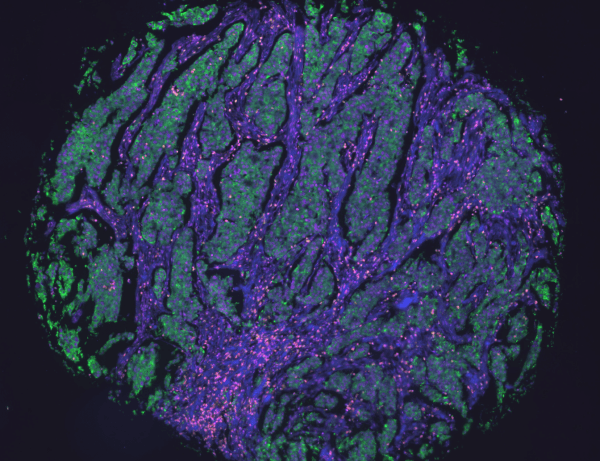Highly Multiplexed Immunohistochemistry Services
Biomarker profiling of tissues with 10+ markers on a single slide using our multiplex immunolabeling and imaging services
Modern medicine requires detailed understanding not only of the disease, but of the body’s response to it. A deeper understanding of cellular interactions within the context of cancer and inflammatory diseases is critical to developing better treatments and therapeutic outcomes. With advances in fluorescent probes and imaging technologies, fluorescent immunohistochemistry is a powerful tool to probe cell populations and protein distribution within tissues, but are fundamentally limited by the number of markers that can be assessed simultaneously.
Traditionally, researchers have been limited to the number of markers they can use simultaneously when characterizing slides due to the inherent limitations of fluorescent or chromogenic labeling. At Visikol, we provide our Clients with the ability to move beyond traditional slide labeling and imaging such that they can achieve 10+ labeling from a single slide. We accomplish this using our proprietary EasyPlex™ antibody stripping reagent and co-registration software that allows for antibodies to be removed from tissues such that multiple rounds of sequential labeling can be conducted from the same slide.

Rapid, inexpensive, high-plex microenvironment and biomarker profiling of tissue with any antibody.
Cutting-Edge Tools
Using our proprietary EasyPlex™ antibody stripping reagent, multiple rounds of immunolabeling can be conducted on a single slide, providing unprecedented detail about your samples.
High Value Endpoints
Using digital slide imaging and advanced image analysis, a large number of valuable endpoints can be captured from a single specimen, giving unique insights about cell populations and interactions.
Take Action
Our expert team processes images and analyzes data, delivering actionable insights in an easy-to-read report, so you can make decisions and push forward your research efforts.
How It Works
T-cell Activation Panel
CD3, Granzyme B, Ki67, PanCK
This panel detects the presence of activated T cell in the tumor milieu by labelling for the T cell co-receptor (CD3). It also provides information on the activation status of T cells. Activated T cells secrete cytotoxic serine protease called granzyme b which along with perforins cause tumor cell apoptosis. The panel also includes a proliferation marker (Ki67) and a tumor marker (PanCK).
PD-L1 Checkpoint Inhibition Panel
CD8, CD68, PD-L1, PanCK
This panel is designed for the interrogation of the immune checkpoint inhibition protein PD-L1. PD-L1 binds to the T cell expressed PD-1 receptor and causes functional exhaustion of T cells, dampening the immune response. This panel detects the CD8 positive T cells and immunosuppressive tumor resident macrophages that express CD68 protein on their plasma membrane.
Memory T-cell Panel
CD3, CD45RO, PD-1, PanCK
Designed to interrogate the exhaustion of T cells, this panel includes T cell marker CD3 protein, and CD45RO, a memory T cell marker. Continuous challenge of T cell by tumor antigens in the tumor microenvironment leads to T cell exhaustion. These T cells also develop memory to tumor antigens and upregulate negative regulators such the program cell death protein-1 (PD-1).
Antigen Presenting Cell Panel
CD11b, CD68, CD20, MHC II
As tumors progress most resident macrophages have a reversal of roles from proinflammatory to anti-inflammatory, promoting tumor growth and metastasis. This panel detects immunosuppressive m2-macrophages that express CD68 proteins on their cell surface. Included in this panel are markers for B cells (CD20), professional antigen presenting cells (CD11b) namely dendritic cells, which present antigens by loading them along with MHC class II proteins (also included in this panel).
Custom Panel Design
Learn More about Our Multiplex Services
Imaging Analysis
Transform your multiplex slide imaging data into quantitative insights that will allow you to make more informed decisions during the drug discovery and development process.
Technology Overview
Learn more about how multi-round multiplexing works from slide to pixel. Our proprietary antibody stripping reagent combined with computational co-registration allows for highly-multiplexed datasets from FFPE tissues.
